As college protests over Israel-Hamas war persist, how the GOP is latching onto the moment
WASHINGTON – Pro-Gaza tent encampments on college lawns. Student-led protests in solidarity with Palestinians. Clashes with college administrators and police.
In the eyes of Republicans, the pro-Palestinian protests that have spread across the nation’s college campuses are a dangerous display of disorder and antisemitism – and a political weapon to be used against President Joe Biden.
The college protests have opened a new line of attack for Republicans against Biden and other Democrats heading into this fall’s elections. Republicans are looking to exploit the schism that has developed within the Democratic Party over the war in Gaza by pinning the campus unrest on Biden and the progressive left. Biden is ineffective and incapable of stopping the country from dissolving into chaos, they argue, while the party’s far-left flank is pushing lawlessness and anarchy.
Seven months after the opening of the war, a flicker of hope arrived Monday when the Palestinian militant group Hamas said it has accepted a cease-fire and hostage-release proposal. Israel remained skeptical, however, and said it is reviewing the terms of the deal.
Here’s a closer look at how the college protests unfolded and how Republicans are latching onto the political opportunity they represent in the razor-tight race for the White House:
Oct. 7: Hamas attacks Israel – and students react
At 6:30 a.m. on a Saturday last fall, the Palestinian militant group Hamas fired a barrage of rockets across southern Israel. The rockets were a cover for the brazen attack to follow. An hour later, Palestinian gunmen breached security barriers and infiltrated Israel by land, air and sea, killing 1,200 people, taking 253 hostages and touching off a bloody war that threatened to engulf the Middle East.
Later that same day, some 5,000 miles to the west, a group of students at Harvard University issued a statement holding “the Israeli regime” entirely responsible for the unfolding violence.
“Today’s events did not occur in a vacuum,” read the statement released by the Harvard Undergraduate Palestine Solidarity Committee and cosigned by 33 other Harvard student organizations.
“For the last two decades,” it said, “millions of Palestinians in Gaza have been forced to live in an open-air prison. Israeli officials promise to ‘open the gates of hell,’ and the massacres in Gaza have already commenced.”
Reaction was predictable and swift. Harvard alumni, donors, university professors and other students stepped forward to slam not only the students’ remarks but the university’s lack of response.
Former Harvard president Larry Summers faulted the school administration for what he said was its “failure to disassociate the university” from the statement and condemn it. Harvard had previously spoken out against “police violence” and in support of Ukraine after it was attacked by Russia, noted Summers, who served as U.S. Treasury secretary under President Bill Clinton.
In nearly 50 years of @Harvard affiliation, I have never been as disillusioned and alienated as I am today.
— Lawrence H. Summers (@LHSummers) October 9, 2023
In Congress, lawmakers on both sides quickly piled on.
“Abhorrent and heinous,” Rep. Elise Stefanik, a New York Republican and Harvard graduate, wrote on X, formerly Twitter. She accused the students of excusing the “slaughter of innocent women and children.”
Israel was “the victim of a terrorist attack,” said Rep. Ritchie Torres, D-N.Y., countering there were “no both sides” to the confrontation. “Hamas is the perpetrator,” he wrote on X. “It’s as simple as that.”
The student statement’s “blazing hatred and antisemitism are utterly blinding,” said Sen. Ted Cruz, R-Texas, a graduate of Harvard Law School.
As antisemitic acts started to rise on college campuses, the House and Senate each passed resolutions condemning antisemitism at institutions of higher education. The vote in each chamber was bipartisan.

Oct. 9: Harvard president weighs in – three times
With criticism over their silence on the Hamas’ attacks swelling, Harvard administrators decided to speak out.
The administration, led by newly inaugurated President Claudine Gay, issued a statement on Oct. 9 saying it was “heartbroken by the death and destruction unleashed by the attack by Hamas” and by the war in Israel and Gaza.
The statement did not, critics pointed out, explicitly condemn Hamas or mention the students’ statement blaming Israel for the violence.
Gay tried again. A day later, she issued a statement calling the Hamas attack “abhorrent” and making clear the student groups did not speak for the university.
Critics still weren’t appeased, so Gay tried a third time. In a video released Oct. 12, Gay emphasized that the university embraces a commitment to free expression.
“That commitment extends even to views that many of us find objectionable, even outrageous,” said Gay, the first person of color and only the second woman to serve as president in Harvard’s 388-year history.
“We do not punish or sanction people for expressing such views,” Gay added.
Still, the criticism rolled in.
Stefanik, Cruz and a handful of other lawmakers sent a letter to Gay on Oct. 13, saying the entire Harvard leadership was complicit in “creating an environment that enables antisemitism.”
“This type of unified hate and ignorance cannot be allowed at Harvard University, and you must investigate its origins,” the letter said.
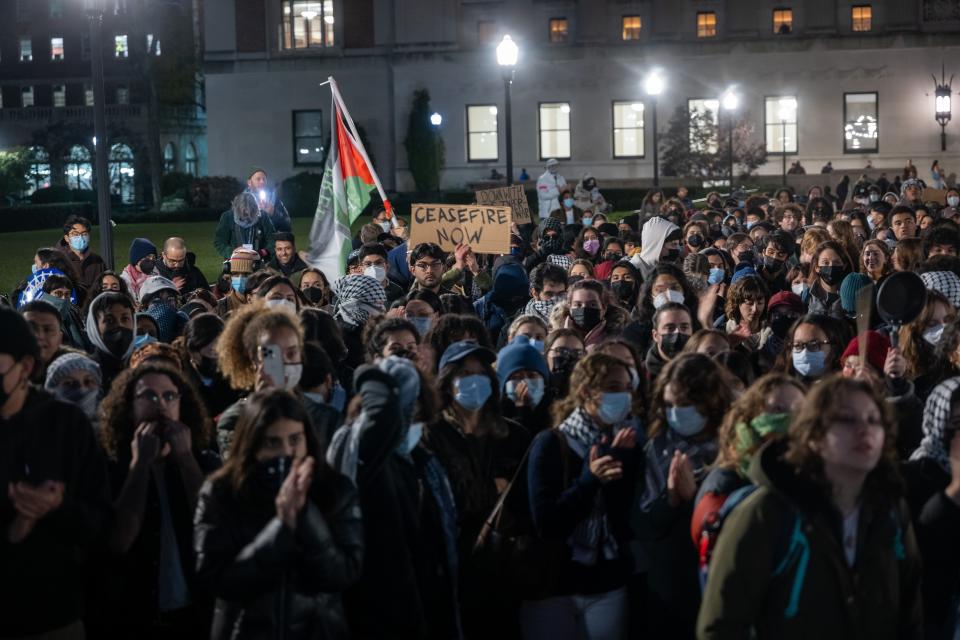
Oct. 19: 'We cannot protect your child'
His voice rising in anger, Shai Davidai had an alarming message for parents of American college students.
The assistant professor at Columbia Business School delivered what he called “an open letter” to parents while speaking at a pro-Israel rally on the school’s New York City campus.
Davidai, who is Jewish and Israeli American, shamed Columbia President Minouche Shafik for allowing “pro-terror student organizations” on campus and described how the participants at one pro-Palestinian demonstration sang songs celebrating the rape of teen-age girls. Directing his remarks to other parents, the father of two warned, “We cannot protect your child.”
A video of Davidai’s speech quickly went viral.
Davidai’s message hit a nerve because it came as colleges across the country were starting to report a rise in antisemitic acts. The Anti-Defamation League, a Jewish advocacy group, said it recorded 732 campus-based antisemitic acts between Oct. 7 and the end of 2023 alone – a staggering 1,062% increase over the same two-month period a year earlier.
Just a week before Davidai’s message to parents, a 24-year-old student at Columbia reported that he had been attacked and beaten with a stick after putting up posters with the names and photos of Israelis reportedly taken hostage by Hamas. The victim, who identified himself only as “I.A.,” told the Columbia Daily Spectator, the student newspaper, that he was assaulted when he confronted another student ripping the fliers off a wall. The suspect, Maxwell Friedman, 19, was charged with assault and harassment as a hate crime.
In another tense moment, pro-Israel students at Cooper Union, a private college in lower Manhattan, reported on Oct. 25 that pro-Palestinian demonstrators banged on closed doors and chanted outside the library where they were studying. School staff locked them in the library because of safety concerns.
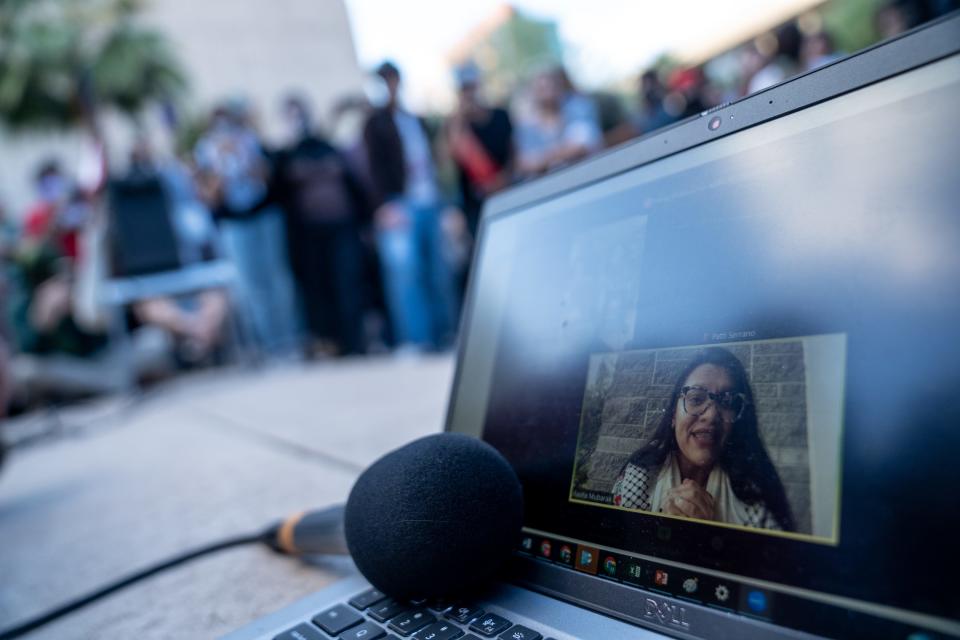
Nov. 7: Congress censures its only Palestinian American member
Rep. Rashida Tlaib, holding up a photo of her grandmother, fought back tears.
“I can't believe I have to say this, but Palestinian people are not disposable,” the only Palestinian American in Congress said. “We are human beings.”
A few hours later, Congress would vote to censure the three-term lawmaker, citing her previous public statements on the war in Gaza and accusing her of promoting “false narratives” on the Hamas attack on Israel and calling for the destruction of Israel.
Among her infractions: Posting a video on social media in which she uttered the phrase “from the river to the sea,” a pro-Palestinian slogan that Israel’s supporters say is antisemitic and a call to destroy the state of Israel.
Tlaib insisted her comments on the war were aimed at the Israeli government, not the Jewish people. But her explanation failed to convince her detractors. The vote to censure her was 234-188, with 22 Democrats joining Republicans in her rebuke.
Though a censure is a form of punishment one step below expulsion from the House, it carries no legal consequences and does not strip Tlaib of her title or power to vote.
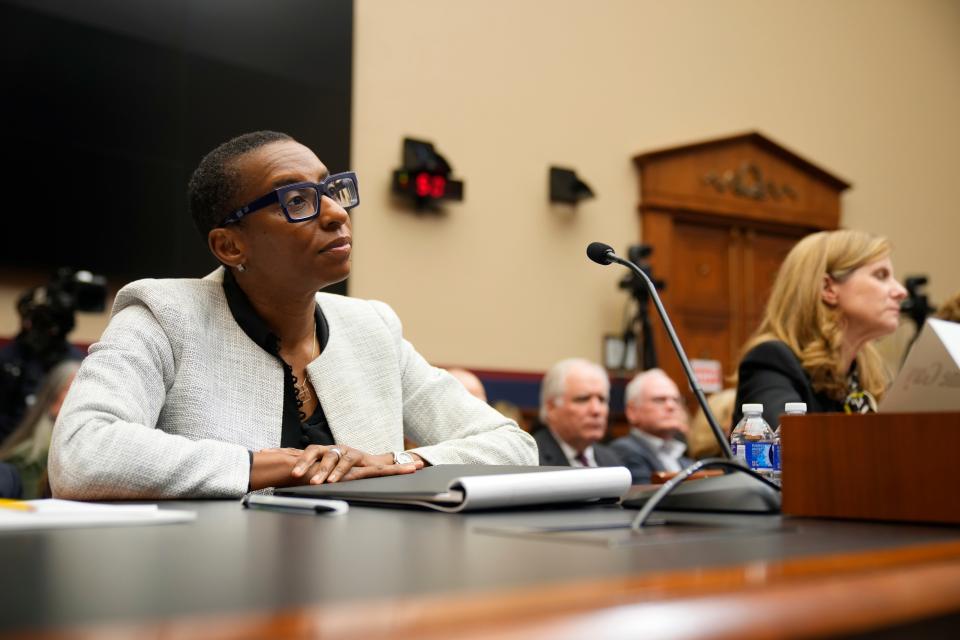
Dec. 5: College presidents stir outrage
The question from lawmakers seemed straightforward enough. Is calling for the genocide of Jews a violation of college codes of conduct against bullying and harassment?
But the non-answers given by the presidents of three elite American universities triggered a fierce backlash that stretched from their campuses to the White House and would prompt two of them to resign.
Harvard’s Gay, Liz Magill of the University of Pennsylvania and Sally Kornbluth of the Massachusetts Institute of Technology were hauled before a Republican-led House congressional committee in Washington in December to explain how their institutions had handled a rise in antisemitism on their campuses since the start of the Israel-Hamas war.
All three rejected GOP claims they were allowing antisemitic acts to happen on their campuses. They insisted they took proper steps to combat bias against Jews when needed, including providing support for Jewish students and forming task forces to address the issue.
The hearing’s most notable moment came when Stefanik, a member of the committee, asked whether calling for the genocide of Jews violates their institutions’ rules and codes of conduct. None of the presidents offered clear statements, refusing to explicitly say whether such an action would amount to a violation. Their answers – or lack of – quickly drew widespread condemnation and calls for their resignation.
Magill resigned four days later. Gay resigned within a month. Kornbluth resisted calls for her to step down and remains the president of MIT.
Stefanik, who is on the list of potential Trump vice presidential running mates, saw her stock rise after the hearing. Her Republican colleagues showered her with praise for her line of questioning.

March 18: 'I think they hate Israel'
As concerns over antisemitism stoked divisions and tensions simmered among Democrats, Donald Trump fanned the flames.
Just days after he became the GOP’s presumptive nominee for president, Trump granted a lengthy interview to one of his former advisers, Sebastian Gorka, who hosts a show on the Salem Radio Network. In one segment, the far-right host asked Trump about Senate Majority Leader Chuck Schumer’s call for a new election in Israel. Trump, who has spread antisemitic tropes and courted rapper Kanye West and others who have made antisemitic remarks, responded with a diatribe in which he disparaged Democrats and the Jews who support them.
Democrats? “I think they hate Israel,” he said.
Jews for Democrats? “Any Jewish person that votes for Democrats hates their religion,” he declared. “... They hate everything about Israel, and they should be ashamed of themselves because Israel will be destroyed.”
Asked about the former president’s remarks, House Speaker Mike Johnson, R-La., dodged the question at a weekly leadership news conference. “I don’t speak for President Trump,” he said.
Johnson did, however, offer that he understood the sentiment Trump was trying to express, pointing to Democrats’ votes against GOP-backed Israel funding bills.
“You see an increasingly large number of Democrats and a big faction of the Democratic party who are standing against Israel openly,” he said. “They’re saying the quiet parts out loud, and to us it’s alarming. And I think it’s shameful.”
April 17: Columbia students erect pro-Gaza encampment
Tensions over the war in Israel swelled further when hundreds of students at Columbia pitched tents and built an encampment on the campus’ South Lawn, demanding the university divest from companies with Israel.
The next day, Shafik, the university president, authorized New York police to swoop in and break up the tent city. Officers in riot gear arrested more than 100 students. Students set up a new encampment and held protests and counter demonstrations.
Days later, hundreds of faculty members staged a walkout in solidarity with the student protests. The protest movement spread rapidly to other campuses across the country, with students at dozens of universities starting their own encampments to pressure administrators to divest from companies the students say aid Israel's war in Gaza.
Coming amid a presidential election campaign, the protests suddenly raised the stakes for Democrats and Republicans.
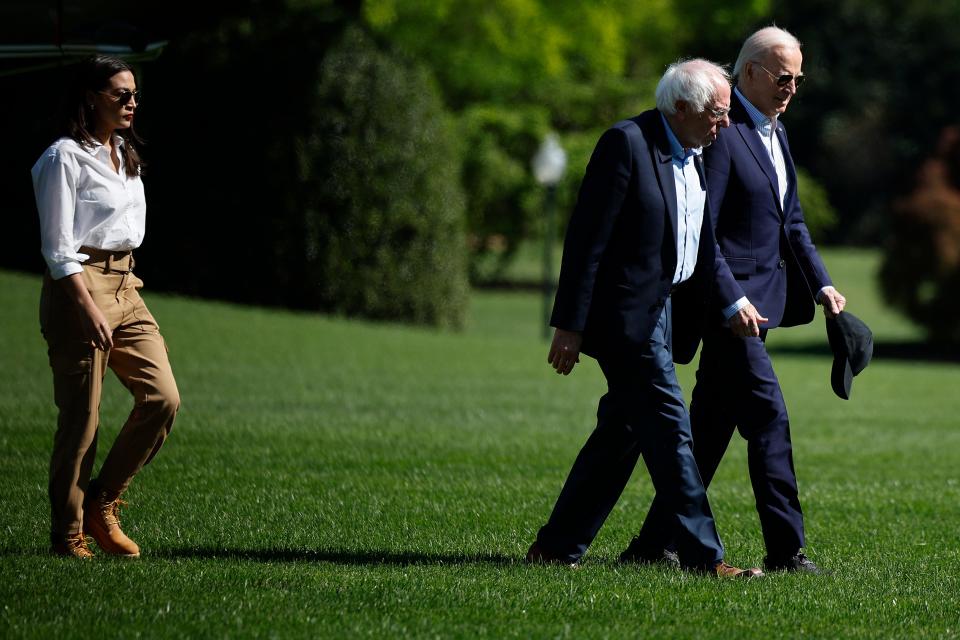
April 23: Democratic divide spills into public view
It started with a tweet from Sen. Bernie Sanders, I-Vt.
Sanders, who is Jewish, vented his frustration on social media after Democrats refused to consider his amendment to end military aid to Israel and Prime Minister Benjamin Netanyahu.
“It is a dark day for democracy when the Senate will not even allow a vote on whether U.S. taxpayer dollars should fund Netanyahu’s war against the Palestinian people,” Sanders wrote on X.
Rep. Jared Moskowitz, D-Fla., a staunchly pro-Israel Jewish Democrat, responded with a tweet of his own. “Bernie, now do AntiSemitism,” he wrote. “Why so quiet?”
Bernie, now do AntiSemitism. Why so quiet? https://t.co/iHFC3HU8ZO
— Jared Moskowitz (@JaredEMoskowitz) April 23, 2024
The divide between Democrats and their progressive left wing had spilled into public view.
Rep. Alexandria Ocasio-Cortez, D-N.Y., leapt to Sanders’ defense. She noted that Sanders’ family was killed in the Holocaust and added that “many other Jewish leaders deserve better than to be treated this way. This is shameful.”
Moskowitz responded that he supported aid to Israel along with humanitarian aid to Gaza. “We are both better than doing this here,” he added.Ocasio-Cortez responded, “Is this what this is?” she asked, including a photo that showed Moskowitz had liked another post from comedian Michael Rapaport that read: “What’s the Hebrew translation for F--- Off Lady?”
The crass message had been directed at her.
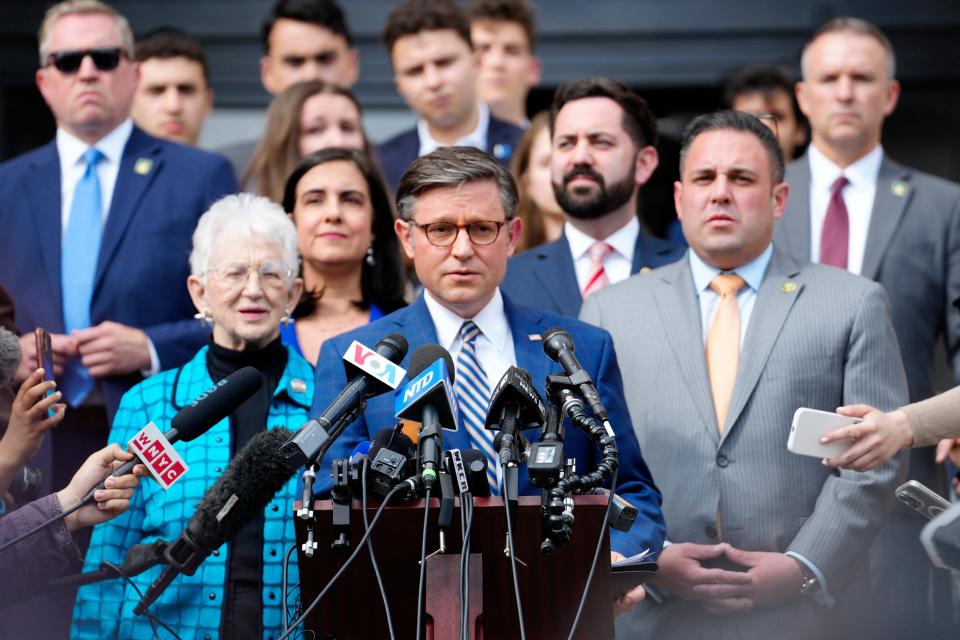
April 24: Speaker Johnson booed at Columbia
House Speaker Johnson said he came to Columbia on a balmy spring Wednesday to hear the concerns of its Jewish students. While he was there, he also delivered a stern lecture to the administration and the student protesters.
Standing on the steps of one of the the school's libraries overlooking the student encampments, the Louisiana Republican spoke about instances of antisemitism on college campuses. He shamed the students and faculty involved in the protests, called for the resignation of the university president and warned that students perpetrating violence should be arrested.
But the most powerful elected Republican in the country's words were drowned out by about 100 students who stood at the bottom of the steps, booing, jeering, laughing and chanting pro-Palestinian refrains. Johnson’s remarks barely registered in the tent city, where students sat in circles painting posters and chanting.
At one point, Johnson exclaimed to students in the encampment: “Go back to class. Stop wasting your parents' money.”
May 2: Biden breaks silence on college unrest
For days, Biden endured attacks from Trump and other Republicans over his silence on the college protests.
“THIS IS A RADICAL LEFT REVOLUTION TAKING PLACE IN OUR COUNTRY,” Trump wrote in an all-caps rant on his social media platform Truth Social.
The presumptive Republican presidential nominee told Sean Hannity of Fox News that Biden is supposed to be the voice of the country but added: “It’s a voice that nobody has heard.”
Last Thursday, Biden made his voice heard. Speaking from the White House Roosevelt Room, Biden condemned violence, destruction and antisemitism on college campuses while defending the right for pro-Palestinian protesters to peacefully demonstrate.
“There’s the right to protest,” he said in his first public remarks on the college unrest, “but not the right to cause chaos."
As Biden was about to leave, a reporter asked whether the protests had caused him to reconsider his policies. “No,” Biden said, walking away.
Republicans pounced.
“Biden wants a civil war to start on college campuses and spill out all over America,” Rep. Marjorie Taylor Greene, R-Ga., wrote on X.
“A complete lack of leadership from an impotent president,” Sen. Tom Cotton, R-Ark., tweeted.
May 6: Hamas says it accepts cease-fire
After weeks of on-again, off-again negotiations, Hamas said it has accepted a cease-fire and hostage-release deal from Egypt and Qatar, who had been serving as mediators in the talks.
But what that would mean for the seven-month-old war remained unclear. Israel said it was reviewing the proposed agreement, which it described as a “softened” version of an earlier proposal.
The agreement that Hamas says it accepted reportedly calls for 33 hostages to be released in exchange for a 40-day truce. A proposal that had been on the table for the last few weeks would have led to the release of 40 hostages in exchange for hundreds of Palestinian prisoners.
This article originally appeared on USA TODAY: How Republicans have latched onto the college protests to upend 2024
